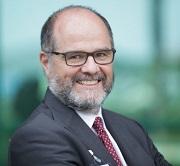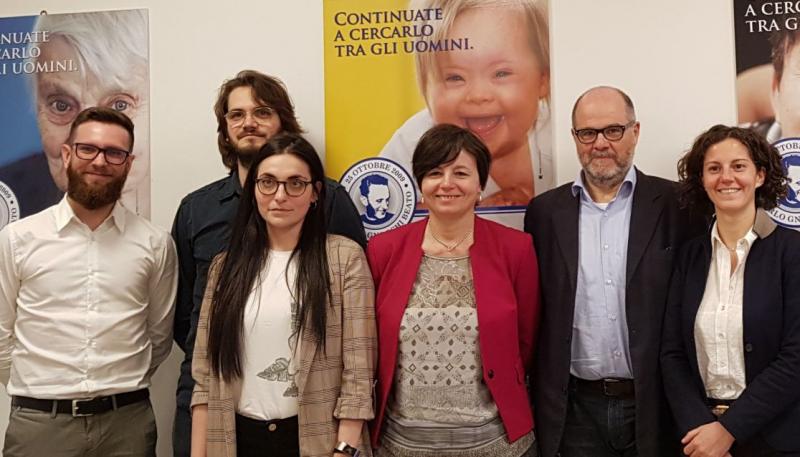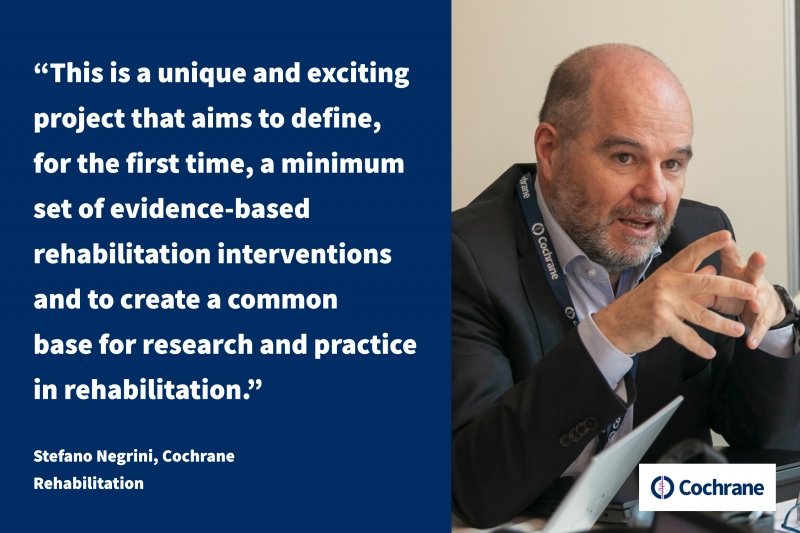

'Cochrane at the WHO' is a blog series that highlights the partnership between Cochrane and the World Health Organization. If you would like to share a story about how your Cochrane Group is working with WHO, please contact Emma Thompson, Advocacy and Partnership Officer.
In this blog post, Stefano Negrini from Cochrane Rehabilitation explains how the Field is supporting WHO’s Rehabilitation 2030 programme, which is developing tools to help Ministries of Health to plan and integrate evidence-based rehabilitation programmes.
Could you give a short overview of Rehabilitation 2030?
"Achieving universal health coverage (UHC) is currently a major focus for the World Health Organization (WHO). One of WHO’s “triple billion” targets is for a billion more people to benefit from UHC by 2023.
Rehabilitation is a key health service area within this remit. With an ageing population, a rise in noncommunicable diseases and people more likely to survive injuries and need support, rehabilitation needs are high and are expected to increase. However, there is a gap between need and access to services, especially in low- and middle-income countries (LMICs).
In this context, WHO launched Rehabilitation 2030: a call for action at the start of 2017 under the leadership of Alarcos Cieza, Coordinator of the Blindness and Deafness Prevention, Disability and Rehabilitation Unit (WHO-BDD). Through this initiative, WHO aims to produce tools that can be used by Ministries of Health to plan and integrate rehabilitation programs, and that these tools can also be applied in LMICs. This includes a guide for action, a rehabilitation competency framework and a package of minimum rehabilitation interventions – which is what we are supporting.
How is Cochrane Rehabilitation involved?
WHO-BDD approached Cochrane Rehabilitation for methodological support for the package of minimum rehabilitation interventions. This work is bringing together the best evidence on rehabilitation and the expertise of key stakeholders to produce a list of essential rehabilitation interventions. The aim is to produce something that is evidence based, but also feasible to implement.
It is being carried out in five stages, as outlined in this article:
- Select priority health conditions and establish technical working groups for each
- Identify best evidence for rehabilitation interventions
- Develop health condition specific packages (expert-based selection from evidence-based interventions)
- Review and feedback on the recommendations
- Production of draft, testing and dissemination
We are mostly involved with the technical working groups, where we provide methodological support, and in the identification and appraisal of evidence for rehabilitation interventions.

Cochrane Rehabilitation Headquarters team: Stefano Lazzarini, Michele Patrini, Roberta Bettinsoli, Maria Chiara Carrozza (Scientific Director of Don Gnocchi Foundation), Stefano Negrini, Chiara Arienti
What stage is the project currently at?
We started work on the project at the end of 2018. 20 different health conditions were prioritized, and we helped recruit experts for the technical working groups for half of these. Each group involves one expert in rehabilitation for the condition, two researchers representing different rehabilitation professions and representatives that offer methodological support – one from Cochrane Rehabilitation (in 10 of the groups) and one from WHO (in the other groups).
WHO’s original plan was to review professional guidelines to develop recommendations, but we encouraged them to supplement this with Cochrane Systematic Reviews. We also helped WHO to strengthen their guideline selection process: they must be evidence-based, have no conflicts of interest, and be checked using the Appraisal of Guidelines for Research & Evaluation Instrument (AGREE II) tool.
Each group is currently checking the evidence for their specific health conditions. We are reviewing all the related Cochrane evidence. In July 2019 the second “Rehabilitation 2030: a call for action” Meeting will be held at WHO and the preliminary results of the first two health conditions will be presented and discussed. The idea is to possibly present the full package at the World Health Assembly in 2020.
Have there been any challenges so far, and how have you addressed them?
We have about 8 months to do the work, which is quite challenging for a global network of volunteers – it is our biggest project to date. We previously did an analysis of the Cochrane Library and found that around 9.5% of Cochrane Systematic Reviews have a rehabilitation component. Overall, we will look at around 250 Cochrane Systematic Reviews done in the last 10 years, which cover 17 of the 21 selected health conditions. However, around a third of these do not have summary of findings tables with GRADE, so we are having to create these at the same time.
Another issue is the attention of this project also to LMICs, yet Cochrane Systematic Reviews are often rooted in high income countries. To try and overcome this, each group that will be selected by WHO-BDD for the second phase after evidence extraction will have representation from LMICs to appraise each recommended intervention from their perspective.

Is there anything else you would like to add?
This is a unique and exciting project that aims to define, for the first time, a minimum set of evidence-based rehabilitation interventions and to create a common base for research and practice in rehabilitation. In the past, rehabilitation has frequently been neglected in healthcare – often thought of as a minority social issue about the inclusion of people with disabilities. We are really happy to have the chance to collaborate with WHO in such a great endeavor.
We hope to do more work with WHO in the next steps of the project and will publish all the results of our work."
Do you work with WHO?
We would love to hear more about how members of the Cochrane community are working with WHO so that we can help publicise these activities.
Please email Emma Thompson, Cochrane Advocacy and Partnership Officer, and let us know.

